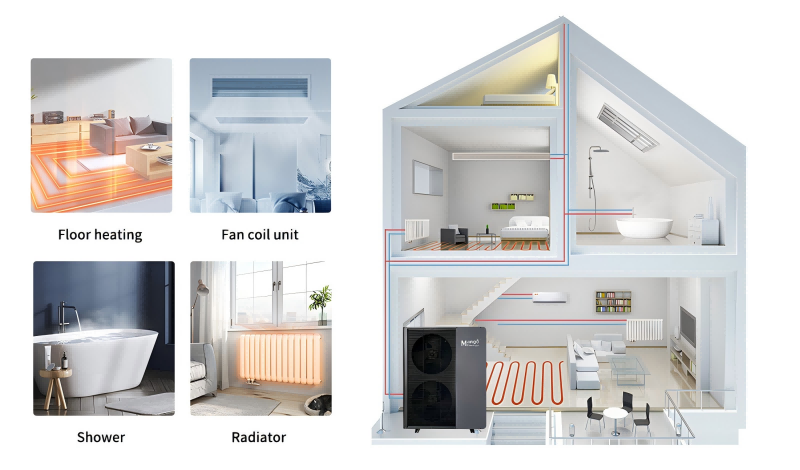
As the world becomes more conscious of the need for sustainable practices, businesses are increasingly seeking ways to reduce their carbon footprint and energy consumption. One effective solution that is gaining popularity is the water ground source heat pump (WGSH). This renewable energy technology offers businesses a way to achieve their green energy goals while also lowering operational costs.
In this article, we'll explore how water ground source heat pumps can help businesses, from commercial properties to hotels and large-scale enterprises, meet their sustainability objectives. By the end, you'll understand how this energy-efficient solution can benefit your business in both the short and long term.
What Are Water Ground Source Heat Pumps?
A water ground source heat pump is an energy-efficient system that uses the consistent temperature of the ground or water bodies to provide heating and cooling for buildings. This system works by circulating a fluid through pipes installed underground or in a water source. The heat pump extracts energy from the ground or water to either heat or cool the building depending on the season.
Compared to traditional heating and cooling systems, WGSH pumps use renewable sources of energy and require less electricity, making them one of the most sustainable options for commercial and industrial applications.
How Can Water Ground Source Heat Pumps Contribute to Green Energy Goals?
Significant Reduction in Carbon Footprint
The primary benefit of water ground source heat pumps is their ability to reduce carbon emissions. Since these systems utilize renewable energy from the earth, they require significantly less electricity than traditional fossil-fuel-based heating and cooling systems. By switching to WGSH, businesses can drastically cut their energy-related carbon emissions, aligning their operations with environmental sustainability goals.
Improved Energy Efficiency and Cost Savings
One of the most significant selling points for businesses is the potential for energy savings. A water ground source heat pump can deliver up to 400% efficiency – meaning that for every unit of electricity consumed, it generates four units of heating or cooling. This level of energy efficiency is much higher than conventional HVAC systems, which can only achieve about 80-90% efficiency.
For large businesses, energy-efficient business heating can result in substantial cost savings on energy bills. Over time, the initial investment in a water ground source heat pump system will pay off in energy savings, further contributing to a company's green energy goals.
Long-Term Sustainability
In addition to energy savings, the durability and longevity of water ground source heat pumps make them a great investment for businesses aiming for long-term sustainability. These systems typically have a lifespan of over 25 years, providing businesses with reliable, low-maintenance solutions for their heating and cooling needs.
By investing in green energy business solutions like WGSH, companies can position themselves as environmentally responsible leaders within their industries.

Key Advantages for Businesses Using Water Ground Source Heat Pumps
Reduced Operational Costs
By implementing a water ground source heat pump, businesses can reduce their heating and cooling costs by up to 70%. This reduction in operational expenses can significantly improve a company’s profit margins, especially for energy-intensive sectors such as hotels, manufacturing, and commercial properties.
Increased Property Value
Commercial buildings that utilize sustainable technologies like water ground source heat pumps often see an increase in property value. With more consumers and businesses seeking environmentally responsible solutions, buildings with green certifications or energy-efficient systems are highly attractive on the real estate market.
Low Environmental Impact
These systems not only reduce a company’s carbon footprint but also minimize their overall environmental impact. Since WGSH systems use the earth's natural energy, they avoid relying on polluting fuel sources. Businesses that invest in this eco-friendly technology demonstrate their commitment to corporate social responsibility (CSR) and contribute positively to the environment.
How Businesses Can Implement Water Ground Source Heat Pumps
Proper System Design and Installation
For commercial properties or businesses looking to implement water ground source heat pumps, it is essential to consult with experts who can design a system that fits the specific needs of the building. Factors such as location, available land, and energy requirements need to be taken into account.
Ongoing Maintenance and Monitoring
While water ground source heat pumps require less maintenance compared to conventional systems, they do need regular checks to ensure optimal performance. Routine maintenance helps identify any issues early, which can extend the system’s lifespan and prevent costly repairs.

Conclusion:
In conclusion, water ground source heat pumps are an excellent way for businesses to achieve their green energy goals while also realizing significant savings in energy costs. By leveraging the earth’s renewable energy, businesses can reduce their environmental impact, enhance operational efficiency, and improve sustainability.
As the demand for sustainable business practices grows, investing in energy-efficient business heating solutions like water ground source heat pumps positions companies for success in a rapidly evolving market. Not only does it support the global shift toward greener energy solutions, but it also provides a competitive advantage in today’s environmentally conscious world.
FAQ
Q1: Can water ground source heat pumps work in cold climates?
Yes, water ground source heat pumps can function effectively in cold climates. They draw heat from deep within the ground or water, where temperatures remain relatively constant year-round.
Q2: How long do water ground source heat pumps last?
These systems typically last between 25 to 50 years, depending on proper maintenance, making them a long-term, cost-effective solution for businesses.
Q3: Are water ground source heat pumps suitable for all types of commercial properties?
Yes, they are suitable for most commercial properties, including hotels, office buildings, and industrial sites. However, the system design must be customized to suit the specific energy needs of each business.


